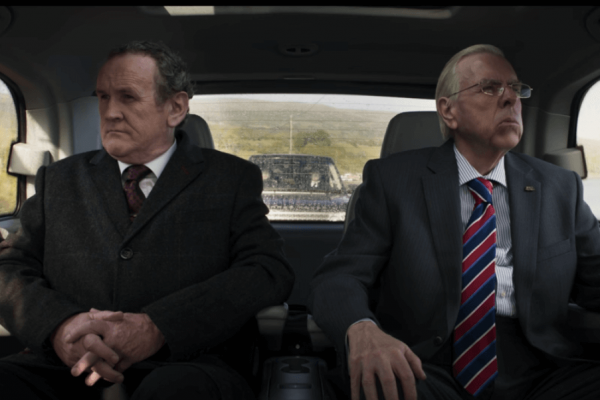In 2006, members of two warring factions in the decades-long Northern Ireland conflict met with the British government in Scotland to negotiate a peace agreement. Two of them —Martin McGuinness, a former IRA leader turned politician, and Ian Paisley, a firebrand conservative, British loyalist, and Protestant preacher — traveled back from Scotland to Belfast on the same private plane. The two men had never spoken directly before. Afterward, however, they managed to not only to nail down a compromise, but to work together compatibly for years. That begs the question: What happened on that trip to change the minds of these two enemies?
The new film The Journey attempts to answer that question by dramatizing the interaction between McGuinness (played in the film by Colm Meaney) and Paisley (Timothy Spall) as they travel together. Director Nick Hamm moves the action from the plane to a car taking the two men to the airport, and presents wholly invented dialogue (when asked, neither the McGuinness nor Paisley camps agreed on what was actually said). However, the film presents an interesting hypothetical, as well as a much-needed example of necessity and compromise overcoming deeply entrenched divisions.
To its credit, the film never comes down hard on one side or the other — both men are responsible for sowing hatred and violence, and have different attitudes towards their political legacies. McGuinness is conflicted — he believes his position is right, but regrets the violence committed to achieve the goal of reunification. Paisley is outwardly stubborn in maintaining he’s done nothing wrong (he didn’t throw any bombs, after all,) but inwardly seems to feel differently about the ultimate consequences of his words and actions.
Unfortunately, the script, by writer Colin Bateman often tends toward the bland, with the exception of a couple of pivotal scenes. Both Paisley and McGuinness were big, powerful personalities, with many facets to explore. The script, however, takes what could be a truly interesting exploration of two dynamic characters, and often reduces them to a pair of old men arguing in the back of a car. There are some standout moments where beliefs are challenged and moments of real emotional honesty are reached, but it takes some waiting to get there.
Despite occasional plodding, The Journey’s overall message is more important now than ever. As we watch politicians in both the U.K. and the U.S. retreat to party lines and refuse to work together, humility and compromise seem increasingly less plausible. Here, however, is an example of a political compromise that came out of decades of violence, and managed to accomplish something important. However flawed that partnership may have been in real life (and however flawed the movie about it might be), it’s still worth having a reminder that peace is, in fact, possible, if we’re willing to put egos and differences aside and have an honest person-to-person talk about it.
Got something to say about what you're reading? We value your feedback!







